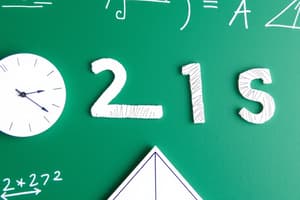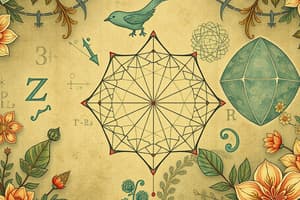Podcast
Questions and Answers
Which branch of mathematics focuses on change and motion, including derivatives and integrals?
Which branch of mathematics focuses on change and motion, including derivatives and integrals?
- Discrete Mathematics
- Statistics
- Calculus (correct)
- Geometry
What is the key concept of geometry that relates to the study of shapes and angles?
What is the key concept of geometry that relates to the study of shapes and angles?
- Variables
- Graphs
- Functions
- Points (correct)
Which operation is NOT a basic arithmetic operation?
Which operation is NOT a basic arithmetic operation?
- Subtraction
- Evaluation (correct)
- Addition
- Multiplication
What is a common misuse of statistical data interpretation?
What is a common misuse of statistical data interpretation?
Which concept primarily deals with the relationships between angles and sides in triangles?
Which concept primarily deals with the relationships between angles and sides in triangles?
Which of the following is NOT a type of algebra?
Which of the following is NOT a type of algebra?
What is a primary advice for studying mathematics effectively?
What is a primary advice for studying mathematics effectively?
Which tool is commonly used for complex calculations in mathematics?
Which tool is commonly used for complex calculations in mathematics?
Flashcards are hidden until you start studying
Study Notes
Overview of Maths
- Mathematics is the study of numbers, shapes, quantities, and patterns.
- It is divided into various branches: arithmetic, algebra, geometry, calculus, statistics, and more.
Key Branches of Mathematics
-
Arithmetic
- Basic operations: addition, subtraction, multiplication, division.
- Concepts of integers, fractions, decimals, and percentages.
-
Algebra
- Involves symbols and letters to represent numbers and quantities in equations.
- Key concepts: variables, expressions, equations, functions.
- Types of algebra: linear, quadratic, polynomial.
-
Geometry
- Study of shapes, sizes, and properties of space.
- Key concepts: points, lines, angles, surfaces, solids.
- Important theorems: Pythagorean theorem, properties of triangles, circles.
-
Calculus
- Focuses on change and motion; includes derivatives and integrals.
- Key ideas: limits, continuity, differentiation, integration.
- Applications: physics, engineering, economics.
-
Statistics
- Involves the collection, analysis, interpretation, and presentation of data.
- Key concepts: mean, median, mode, variance, standard deviation.
- Types: descriptive statistics, inferential statistics.
-
Discrete Mathematics
- Studies mathematical structures that are fundamentally discrete.
- Key areas: graph theory, combinatorics, logic, set theory.
Mathematical Concepts
- Number Theory: Study of integers and their properties.
- Functions: Relation between a set of inputs and a corresponding set of outputs.
- Graphing: Visual representation of functions and data.
- Trigonometry: Study of relationships between angles and sides of triangles.
Important Mathematical Tools
- Calculators: For computation and graphing.
- Mathematical Software: Tools like MATLAB, Mathematica for complex calculations.
- Visualization Tools: Graphs and charts to represent data visually.
Study Tips for Mathematics
- Practice regularly with exercises and problems.
- Ensure a strong foundation in basic principles before advancing.
- Use visual aids (graphs, charts) to understand concepts better.
- Work in groups to solve problems collaboratively.
- Relate mathematical concepts to real-world applications for better comprehension.
Overview of Mathematics
- Mathematics is the study of numbers, shapes, quantities, and patterns.
- It is a broad subject with various branches: arithmetic, algebra, geometry, calculus, statistics, and more.
Arithmetic
- Involves basic operations: addition, subtraction, multiplication, division.
- Deals with concepts of integers, fractions, decimals, and percentages.
Algebra
- Uses symbols and letters to represent numbers and quantities in equations.
- Key concepts include variables, expressions, equations, and functions.
- Different categories of algebra exist: linear, quadratic, and polynomial.
Geometry
- Study of shapes, sizes, and properties of space.
- Key concepts: points, lines, angles, surfaces, solids.
- Important theorems like the Pythagorean theorem, properties of triangles, and circles are studied in this branch.
Calculus
- Focuses on change and motion, using derivatives and integrals.
- Key ideas include limits, continuity, differentiation, and integration.
- Used in fields such as physics, engineering, and economics.
Statistics
- Deals with the collection, analysis, interpretation, and presentation of data.
- Key concepts include mean, median, mode, variance, and standard deviation.
- Two types of statistics: descriptive statistics and inferential statistics.
Discrete Mathematics
- Studies mathematical structures that are discrete.
- Key areas: graph theory, combinatorics, logic, and set theory.
Important Mathematical Tools
- Calculators assist with computation and graphing.
- Mathematical software like MATLAB and Mathematica are used for complex calculations.
- Visualization tools, such as graphs and charts, are used to represent data visually.
Mathematical Concepts
- Number Theory: Studies integers and their properties
- Functions: Shows the relationship between input and output sets.
- Graphing: Visually represents functions and data.
- Trigonometry: Studies the relationships between angles and sides of triangles.
Studying That Suits You
Use AI to generate personalized quizzes and flashcards to suit your learning preferences.




